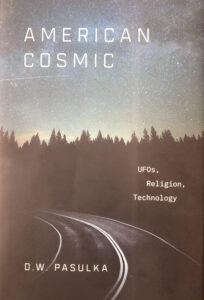American Cosmic: UFOs, Religion, Technology by D. W. Pasulka. Oxford University Press, Oxford, 2019. ISBN: 9780190692889. Hardback: 269 pp.
Having read the subtitle of this book, you might be wondering: what, exactly, has a study of UFOs, religion and technology got to do with the aims and interests of this website? The answer, as it turns out, is quite a lot, as I will seek to show.
Two things are of immediate note: (a) Diana Pasulka is a professor of religious studies at the University of North Carolina Wilmington, and chair of the Department of Philosophy and Religion there; and (b) her book is indeed about UFOs. To these things we might add a third: American Cosmic is published by Oxford University Press. Having these three ducks in a row is unusual. As Pasulka herself avers early on: academics don’t tend to write about UFOs, and if they do have an interest in such things it’s usually under the cloak of anonymity. That she was able to attract a high-end academic publisher like OUP makes the mix stranger still. But, then again, American Cosmic is a strange kind of book.
Actually, it reads like a combination of two books, with one considerably better than the other. Firstly we have various accounts of the author’s interactions with several parties interested in what she refers to as ‘the phenomenon.’ Early on, for example, we read of her blindfolded trip into the New Mexico desert with UFO experiencer ‘James’ and the enigmatic ‘Tyler D.’ ‘Tyler’ claims he knows where crashed UFO wreckage might be located and, sure enough, the trio stumble over some. Later in the book we learn that scientific examination reveals it to be not of this Earth, although the author gives no detail of how it was examined, by whom, and how they reached the conclusions they did. I suspect that ‘Tyler’ was having her on – indeed, at one point she and ‘James’ begin to suspect that he’s setting them up – but this is something that she doesn’t press, and it’s quickly dropped. These autobiographical chapters – often mini-travelogues – are very well written but, as is certainly the case when she details her travels with ‘Tyler’, marked by a certain naivety that left me shaking my head.
The other ‘part’ of her work is, however, considerably better. In essence, Pasulka presents and explores the thesis that belief in UFOs and extraterrestrials constitutes a new form of religion; a mythos delivered by twenty-first technology which, in essence, shapes UFO testimonies into forms sometimes radically at odds with the detail of the sightings and encounters themselves. This is where the author is at her most convincing, especially where she shows how documentaries in particular can often misrepresent what ‘actually’ happened; implanting what are effectively ‘fake’ narratives into the minds and memories of viewers.
Pasulka’s theological training and expertise make her eminently qualified to explore the UFO ‘phenomenon’ as a religion ‘being born’ and whilst there’s nothing terribly new in this assertion her boldness in so publicly working at the interface of academia and ufology is more than commendable. Kudos to OUP for publishing a ufological work, as well. It’s not unheard-of for academic publishers to encroach on Fortean territory but it’s hardly commonplace and I very much hope that this is a sign of things to come.
So what’s in all of this for readers of this website? Well, I came away from American Cosmic with more than a sneaking suspicion that there’s, for want of a better word, a ‘spiritual’ component to the UFO puzzle. There seems no question that some UFO sightings and events are of something genuinely inexplicable: inexplicable, that is, by our existing paradigms of scientific investigation. Locating the phenomenon within a religious context enables Pasulka to explore this ‘non-physical’ aspect clearly, but it is only an aspect, because the ‘wreckage’ angle suggests that something physical is happening as well. The discerning reader may suspect that there’s something ‘tricksterish’ going on, but whilst the author references George Hansen’s seminal study of tricksters and the paranormal she doesn’t really explore this aspect of the phenomenon in any real detail. This is a missed opportunity but it may well represent fruitful ground for future ufological studies.
An edited version of this review first appeared in Psychical Studies: Journal of the Unitarian Society for Psychical Studies, Spring 2022, Issue 100, pp 33-5
